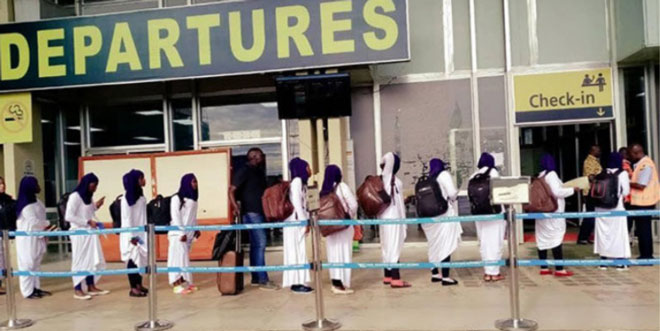
Kampala, Uganda | THE INDEPENDENT | The government of Saudi Arabia has announced a pardon for Ugandans imprisoned for various offenses, according to Esther Anyakun Davinia, the State Minister of Gender, Labor, and Social Development. Speaking at a press conference at the government-owned media center on Monday, Anyakun confirmed that all Ugandans detained, except those serving sentences for capital offenses such as murder and drug trafficking, will be released.
This includes women with children born in Saudi Arabia. The decision was reached during a recent meeting between Ugandan officials, led by Minister Anyakun, and Ahmed Alrajhi, the Minister of Human Resources and Social Development of Saudi Arabia. The meeting, held earlier this month, aimed to address various challenges faced by Ugandan migrant workers in the Kingdom and strengthen bilateral relations.
During the discussions, the Ugandan delegation focused on documenting distressed cases to facilitate the repatriation of citizens. However, Minister Anyakun stated that the fate of Ugandans imprisoned for drug trafficking remains uncertain, as Saudi Arabian laws regarding drugs are stringent.
Joshua Kyalimpa, spokesperson for the Ministry of Gender, Labor, and Social Development, explained that while the government has data on Ugandans who entered Saudi Arabia through legal channels, it is difficult to ascertain the exact number of those in prisons due to the varying records kept by Saudi authorities. He emphasized that the repatriation plan is inclusive of all Ugandans, regardless of how they ended up in Saudi Arabia.
“We found out that Saudi Arabia, using their system, has different numbers, and the government also had another number because of the many Ugandans who go to that country through improper channels,” Kyalimpa stated. A team from the ministry has been dispatched to begin the repatriation process, with plans for Ugandans to start returning home within 60 days.
The minister urged labor externalization companies to educate workers on the cultural expectations and legalities of the countries they are traveling to, highlighting issues related to local herbs being misinterpreted as illegal drugs.
Asha Wilson Owere, the Chief Affairs Officer of an external labor powerhouse, emphasized the need for increased monitoring of Ugandans who migrate for work. He called for collaboration between the Ministry of Internal Affairs, the Ministry of Labor, and the Ministry of Foreign Affairs to combat human trafficking, which often leads to the imprisonment of Ugandans abroad.
Owere also advocated for training and orientation programs for Ugandans being recruited for overseas jobs, focusing on the cultural norms and legal frameworks of their host countries. Saudi Arabia has pledged to expedite the repatriation process and provide support for the reintegration of returned Ugandans, offering hope to families who have lost contact with loved ones who had traveled to the Kingdom in search of better livelihoods.
With over 150,000 Ugandan workers migrating to Saudi Arabia, the country has become the largest destination for labor externalization. In 2023, Uganda and Saudi Arabia signed a bilateral labor agreement, placing responsibility on the host country to uphold the rights of Ugandan workers. This recent development marks a significant step towards addressing the plight of Ugandans abroad and ensuring their safe return home.
*****
URN
 The Independent Uganda: You get the Truth we Pay the Price
The Independent Uganda: You get the Truth we Pay the Price





